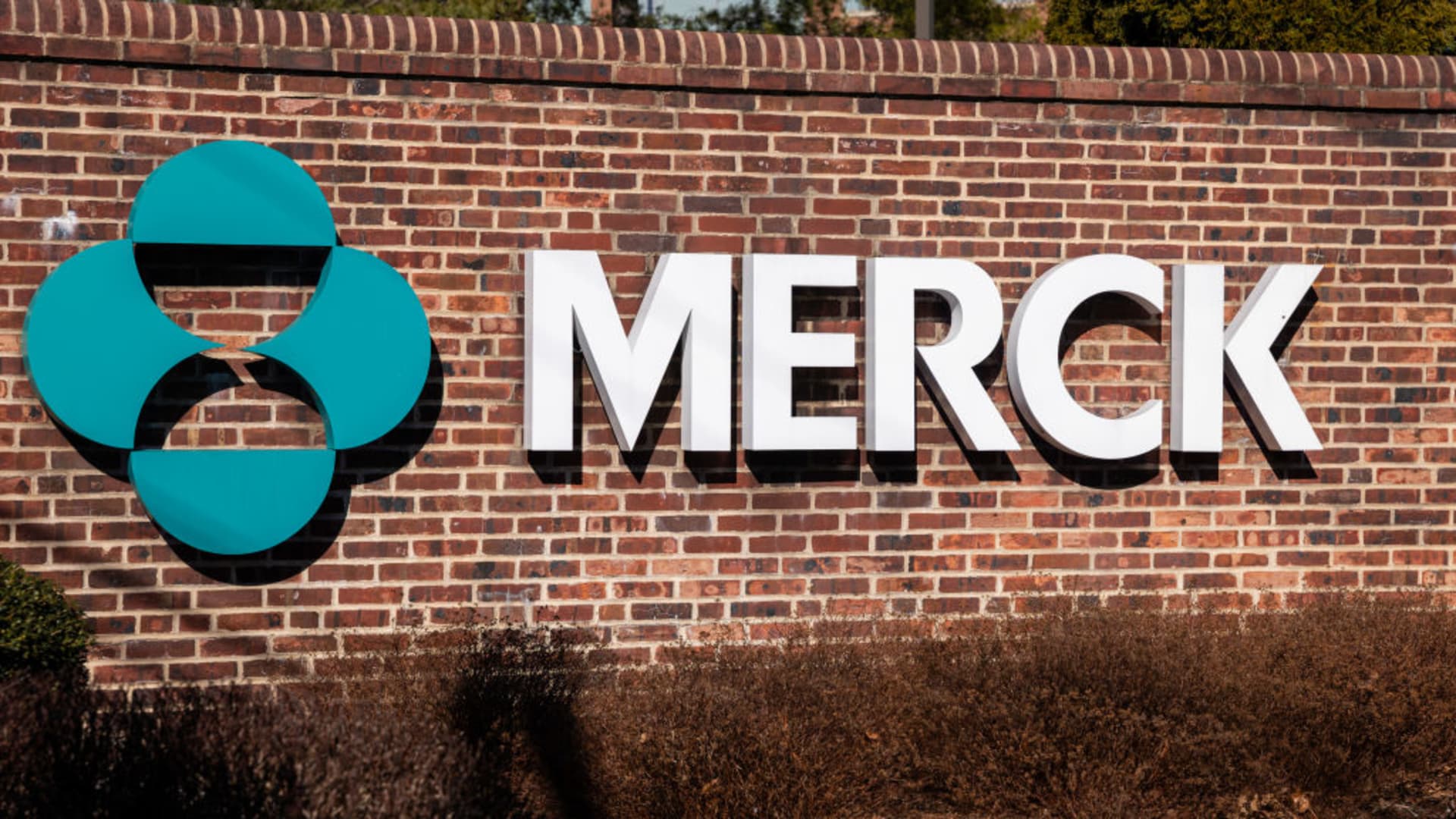Exterior view of the entrance to Merck headquarters on February 05, 2024 in Rahway, New Jersey.
Spencer Platt | Getty Images
Merck on Thursday reported first-quarter revenue and adjusted earnings that topped expectations as it posted strong sales of its blockbuster cancer drug Keytruda and vaccine products.
The pharmaceutical giant also raised and narrowed its full-year revenue and adjusted earnings forecasts. Merck now expects 2024 sales to come in between $63.1 billion and $64.3 billion, up from previous guidance of $62.7 to $64.2 billion.
The company expects full-year adjusted earnings of $8.53 to $8.65 per share, up from its prior forecast of $8.44 to $8.59 per share.
That outlook includes a one-time charge of roughly 26 cents per share related to Merck’s acquisition of Harpoon Therapeutics in January. The company develops immune-based cancer drugs. The guidance also includes a negative impact of 30 cents per share from foreign exchange changes.
Here’s what Merck reported for the first quarter compared with what Wall Street was expecting, based on a survey of analysts by LSEG:
- Earnings per share: $2.07 adjusted vs. $1.88 expected
- Revenue: $15.78 billion vs. $15.20 billion expected
The company posted a net income of $4.76 billion, or $1.87 per share, for the first quarter. That compares with a net income of $2.82 billion, or $1.11 per share, during the year-earlier period.
Excluding acquisition and restructuring costs, Merck earned $2.07 per share for the first quarter. Both adjusted and non-adjusted profit for the period include the charge related to the Harpoon deal.
Merck raked in $15.78 billion in revenue for the quarter, up 9% from the same period a year ago.
Those results come as Merck shows substantial progress in preparing for Keytruda’s patent expiration in 2028. The loss of exclusive rights to the drug will likely cause sales to fall, forcing the company to draw revenue from elsewhere.
But Merck has a handful of new deals under its belt and key drug launches that will help it offset those losses. That includes Winrevair, a medication approved in the U.S. last month to treat a progressive and life-threatening lung condition. Some analysts expect that worldwide sales of Winrevair could reach $5 billion by 2030.
Merck is also cutting costs under a new restructuring program it announced in February. Those efforts aim to improve the manufacturing network of both its pharmaceutical division and animal health business.
The company recorded charges of $246 million related to restructuring in the first quarter, which are excluded from its adjusted results.
Pharmaceutical division sales jump
Merck’s pharmaceutical unit booked $14.01 billion in revenue during the first quarter, up 10% from the same period a year ago. That division develops a wide range of drugs for several disease areas, including oncology and infectious diseases.
Merck’s immunotherapy Keytruda, which is used to treat several types of cancer, largely drove the growth. Keytruda generated $6.95 billion in revenue during the quarter, up 20% from the year-earlier period.
Analysts had been expecting $6.71 billion in Keytruda sales, according to estimates from FactSet.
Merck also reported a jump in sales of Gardasil, a vaccine that prevents cancer from HPV, the most common sexually transmitted infection in the U.S.
Gardasil brought in $2.25 billion in sales, up 14% from the first quarter of 2023. That’s in line with the $2.24 billion that analysts expected, FactSet estimates said.
Another vaccine called Vaxneuvance, which prevents patients from getting sick with pneumococcal disease, also posted strong growth during the quarter. The shot recorded $219 million in sales, up 106% from the year-earlier period.
Meanwhile, Merck’s Type 2 diabetes treatment Januvia drew $670 million in sales, down 24% from the same period a year ago. The company said the decline was primarily due to lower prices of the drug, falling demand in the U.S. and generic competition in several international markets.
Analysts had expected Januvia sales of $687.3 million, according to FactSet estimates.
Januvia is one of 10 drugs targeted in ongoing Medicare drug price negotiations, a policy under the Inflation Reduction Act that aims to make costly medications more affordable for seniors.
Sales of Merck’s Covid antiviral pill Lagevrio also fell 11% to $350 million during the quarter. Still, that total blew past analysts’ expectations of $106.4 million in sales, according to FactSet.
Demand for Lagevrio and other Covid products from companies such as Pfizer and Moderna has plunged over the last year, as cases and public concern about the virus dwindled from their pandemic peaks.
Merck’s animal health division, which develops vaccines and medicines for dogs, cats and cattle, posted $1.51 billion in sales for the first quarter. That’s up only 1% from the same period a year ago.
In February, Merck said it would buy Elanco Animal Health‘s aquatic business for $1.3 billion in cash. The deal includes Elanco’s entire portfolio of medicines, vaccines and supplements for aquatic species, along with two manufacturing plants and a research facility.

